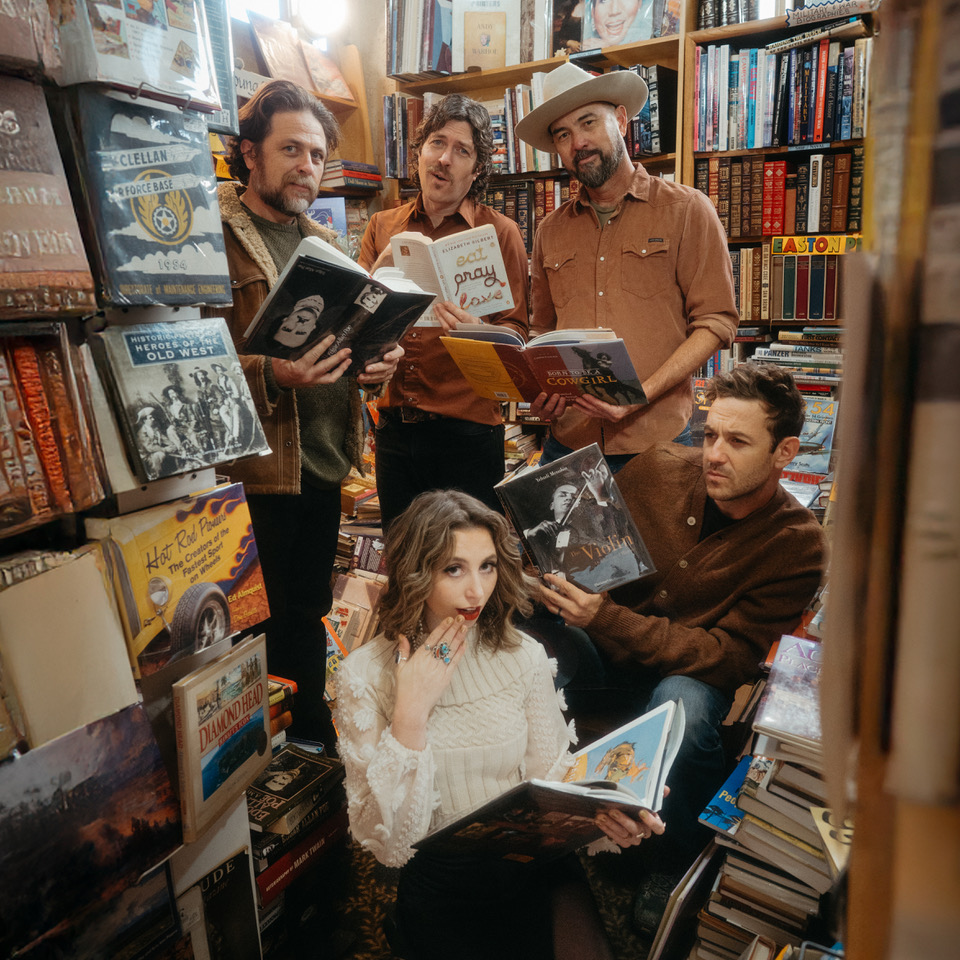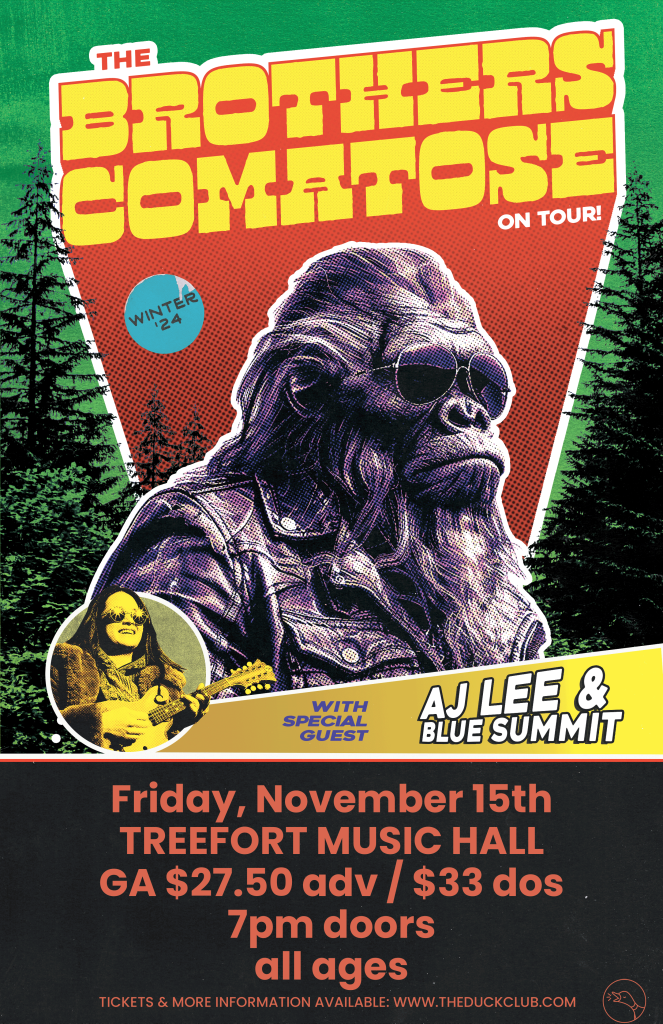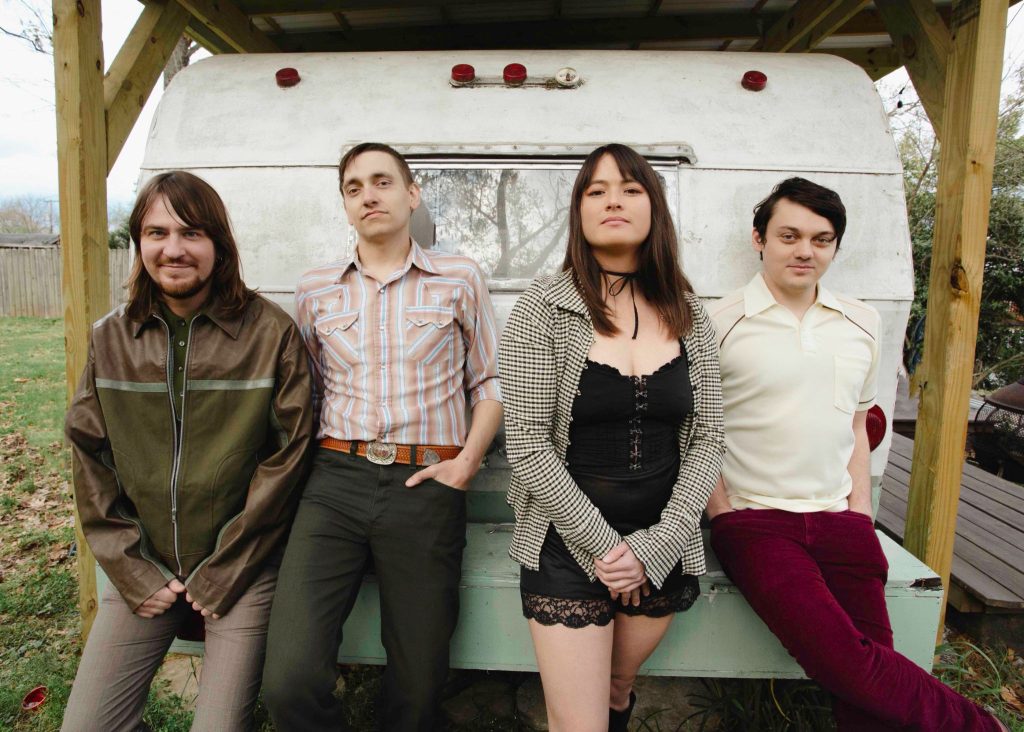THE BROTHERS COMATOSE
Friday, November 15th, 2024



The Brothers Comatose didn’t set out to coin a new genre. To be honest, it was a bit of an accident.
“My brother and I have a lot of respect for bluegrass,” explains guitarist/singer Ben Morrison, “but it was never in our blood. We were raised on California rock and folk and country music, so when we got our hands on some traditional acoustic instruments growing up, that’s just the energy and the attitude we naturally channeled. A fan started calling our sound Golden Grass, and the phrase just felt right.”
So right, in fact, that the band named their intoxicating new album after the moniker. Recorded in the Bay Area with co-producers Greg Holden and Tim Bluhm, Golden Grass cements The Brothers Comatose as the standard bearers of a thriving, innovative West Coast roots movement, one that fuses old school string band instrumentation with singer/songwriter craftsmanship and rock and roll exuberance, all with a deeply rooted sense of place. The songs here are as diverse and enthralling as the Golden State landscape itself—at times carefree and breezy, at times wild and rugged—and the performances are lush and organic to match, propelled by rich vocal harmonies and driving fiddle (Phil Brezina), banjo (Alex Morrison), mandolin (Addie Levy), and upright bass (Steve Height). And while the collection marks the group’s first release with Levy in the lineup, the result is quintessential Brothers Comatose, a warm, joyful reflection on identity and the ties that bind from a band that knows exactly who they are (and exactly where they come from).
“The Golden Grass sound is a little more laidback than high and lonesome,” Morrison explains. “It’s more relaxed than it is refined. It’s got all sorts of natural imagery, from the desert to the ocean to the redwood forests, but at its heart, it’s a campfire jam on the beach where anyone can strum a few chords and join in. The more the merrier.”
That spirit of inclusion has been central to the band from the start. Founded by Morrison and his brother, Alex, in 2008, the San Francisco-based quintet first emerged to widespread acclaim with their 2010 debut, Songs From The Stoop, which helped earn dates with the likes of Gillian Welch & David Rawlings, Greensky Bluegrass, and Trampled By Turtles. In the decade-and-a-half that followed, The Brothers Comatose would go on to release five more full-length LPs (along with a slew of singles and adventurous cover EPs), rack up nearly 50 million streams, land festival slots at Outside Lands, High Sierra, and Hardly Strictly Bluegrass, tour with Lake Street Dive, The Devil Makes Three, and Yonder Mountain String Band, and build up a devoted following thanks to their raucous live shows and relentless schedule.
Life on the road came with a cost, though, and in 2024, longtime mandolinist Greg Fleischut decided to part ways with the group, which had already begun recording Golden Grass during what little free time they could muster.
“We’d always thought it would be cool to have a female voice to hit those high harmonies,” recalls Morrison, who invited Levy to join the band following Fleischut’s departure. “Addie’s such an incredible mandolin and fiddle player, but she’s also a great singer and songwriter in her own right, and at just 23, she brings a really exciting energy to what we do.”
With Levy onboard, the band returned to the studio during breaks from tour to cut the second half of Golden Grass, embracing the new blood and sonic growth while at the same time doubling down on their distinctive genre-bending sound and character.
“This album came together over a long period of time, and it bridges the lineup change,” says Morrison, “so the songs really represent an amalgamation of different periods in our lives. Alex and Addie and Phil all wrote tunes for it, as well, so there’s a lot of variety, but there’s a throughline of live performance that ties the whole thing together.”
That live energy is plain to hear on Golden Grass, which opens with the infectious title track. “Way out west we do it differently / Untraditionally,” Morrison sings in airtight harmony with his bandmates. “We’ll just burn one down / Can you feel it? / Just relax / It’s Golden Grass.” Like much of the album, the tune is a celebration of home and family, one delivered with both earnest sincerity and sly humor (listen closely and you’ll catch shout outs to a host of other California artists, from Jerry Garcia’s bluegrass outfit, Old & In The Way, up through contemporaries like Molly Tuttle and AJ Lee & Blue Summit). The loping “Hills of San Francisco” turns the city’s slanted streets into a metaphor for life’s ups and downs, while the playful “IPA Song” finds humor in the band’s love/hate relationship with their state’s most recognizable beer, and the poignant “Home Again” (featuring Lindsay Lou on vocals) reckons with loss and resilience in the face of the devastating wildfires that have become all-too-regular across the West in recent years.
“We had really good friends lose their house up in the Santa Cruz Mountains, and we’ve been heartbroken watching it happen to so many others all over California,” Morrison explains. “Rather than let it just be a sad song, though, we wanted to capture the beauty that comes with seeing people rebuild and rise from the ashes. We wanted to celebrate the hope that keeps people going through hard times.”
Even when they set their sights beyond California, the band still insists on holding on to that irrepressible sense of hope. The bittersweet “Huckleberry Wine” (written by Alex) revels in the memory of youth and warm summer nights; the exultant “Blue Mountain” (written by Levy) shares a little taste of Appalachia as it embraces the comfort of returning to your roots; and the tender “My Friend” (written by Brezina) celebrates the kind of bonds that transcend time and distance.
“Music has always been rooted in friendship and community for us,” Morrison reflects. “Growing up, our parents used to host parties where all these local musicians would sit around the living room singing and playing together. Somebody left their banjo behind one night, and that’s how Alex and I got started. The rest is history.”
Call it an accident. Call it fate. These days, The Brothers Comatose just call it Golden Grass.

AJ Lee & Blue Summit
AJ Lee & Blue Summit are an award-winning energetic, charming, and technically jaw-dropping band quickly rising on the national roots music scene. Based in Santa Cruz, California, the group met as teenagers, picking and jamming together as kids at local music festivals and jams until one day, they decided they would be a band. “Our roots go really deep,” explains de facto band leader Lee. “We met when we were young kids… We definitely decided to choose each other as a chosen family band later on in life, but in a lot of ways it was naturally just like that in the beginning.” “It was like one of those late at night things,” she continued. “We were sitting on a trailer at Grass Valley” at the annual Father’s Day Bluegrass Festival held in the Sierra Nevada foothills – “Someone said, ‘All of us right here, we’re a band now.’ We kind of didn’t take it seriously, but we were like, okay, we’ll be a band!”
And thank goodness they became a band. Their first gigs were local, small venues, cafes, restaurants, coffee shops, where they’d play for multiple hours honing their set list and learning shared musical vocabularies. Now, as they criss-cross the country performing hundreds of shows a year to larger and larger audiences, you can sense the intention they had back then – to make music together not for just aspirational reasons, but because it’s fun – and it’s all you want to do as young musicians. Currently made up of Lee on mandolin, fiddler Jan Purat, and guitarists Scott Gates and Sullivan Tuttle, the band carries that youthful, festival-parking-lot energy with them still today, but at the same time there’s a genuine ease and confidence to their music making. This is not the bluegrass of ambitious musicians intent on industry success, this is music made firstly for the joy of making it and primarily made for each other. It’s part of why, as they ready their third studio album, City of Glass – their first label release, out July 19th via Signature Sounds – their product feels mature and fully realized, while deep in the Blue Summit pocket.
City of Glass is a slow burn album, remarkable when considered alongside records released by their peers in recent years. Lee & Blue Summit seem unconcerned with mimicking hugely successful jamgrass bands, or making competitive and performatively intellectual new acoustic music, or wishing to establish themselves as the superlative string band in their bluegrass, old-time, and Americana communities. Instead, they’re most interested in discovering themselves, their own music, and sonics and textures truly their own. So, when they went into the studio to track City of Glass and its gorgeous twelve tracks, they once again forsook the roads most traveled by, looking to their local California community for collaborators that also feel right at home in their chosen family band. They brought in Lech Wierzynski, of the California Honeydrops, to produce; they tapped Bay Area steel guitarist Mikiya Matsuda for a couple of tracks; plus they had Californian banjo player, instructor, and Father’s Day Fest veteran Luke Abbott lend five-string to a number.
The group is proud to be Californian, proud to represent the neo-traditionalist bluegrass and folk from the state and the mighty communities surrounding them. Their music shines with this “think global, act local” sort of approach. On a track called, “Can’t Find You At All,” they even included a sort of reunion of “The Tuttles featuring AJ Lee” – the true family band from their early childhoods that also included Lee, Sully Tuttle, Grammy Award winner Molly Tuttle, and their father Jack Tuttle – who wrote “Can’t Find You At All”.
“I thought, Sully’s on the track and Jack wrote it,” Lee explains. “So, I would love for Molly to sing on it, because it does feel like a mini reunion of The Tuttles… It just feels like coming back to where technically my career started, with them.” Throughout City of Glass, an overarching sense emerges that this is a band who knows who they are, what they are trying to say, and who can help them say it. They know they don’t “need” a banjo to be a bluegrass band. They know they, like so many bluegrass groups with mainstream appeal, know how to make two flatpicking guitarists work in concert, together. And, with Wierzynski at the control room helm, they were able to preserve that feeling of grounded self-assuredness indelibly through these songs, while still challenging themselves outside of their comfort zones and outside of the musical box. Focusing on these qualities and bringing in creatives they trusted, they were able to craft an album that sounds exactly like AJ Lee & Blue Summit while still breaking endless new ground. “Having a powerhouse vocalist and someone we trusted in the control room was really valuable and really fun,” Jan Purat says. “I think it removed a lot of the headiness and back and forth… It felt like it was streamlined, in certain ways, being able to trust his judgment, even though he was from a different genre.” Wierzynski also brought songs to the band, a stunning cover of the soul classic “He Called Me Baby” and a song he wrote, “Bedside Window,” which is rendered by the band as an archetypical bluegrass “fast waltz.” Wierzynski prioritized making the band sound exactly like themselves, producing the vocals to be and sound live whenever possible, moving the band along when a take checked all the boxes, and still bringing in genre and aesthetic inspirations that feel brand new. City of Glass, as a result, is an album that’s just as much country soul and gritty, bluesy Americana as it is bluegrass, all framed through a California folk lens while clearly primed for a much wider audience. The title track is a beautiful and evocative metaphor that conjures the climate crisis and holds an inspiring degree of self-awareness, from this group of young folks. As they sing of a wonderful monument to human kind’s achievements, an awesome and temporal city made of glass, grain by grain, shard by shard, they put the fleeting and intangible qualities of a life as professional musicians under the same lens, once again reinforcing that their priorities in music cannot simply be achievements and success. After all, they know that, someday, all of this will fade away. As such, as much as possible, they have their eyes trained first and foremost on the present moment.
“I’ve learned through songwriting and creating music that you shouldn’t hold anything as precious as you think you should,” Lee says, speaking about writing “City of Glass.” “We’re all happy to experience life with each other and to see what this band turns into, but there’s no expectation that this monument we’ve built will stand forever.”
Perhaps this is why it feels like, whether on stage or in the studio, Blue Summit pours all of themselves into every song, every lyric, and every note. “I think it would lose meaning if it did last forever,” Gates agrees. “For so long making music for a living was ‘ride or die,’ but now we’re very much in the moment and we understand that nothing lasts forever. All I care about is just the next step and not skipping any steps in between.”
The slow burn of City of Glass certainly reaches its tenor, but never in a performative, belabored, or corny way. There are many moments of tension and release, of musical climaxes that are tender and subdued or silly and winking – and yes, absolutely barn burning, too. “Seaside,” written by Sully Tuttle, feels pulled directly from a Steinbeck paean to coastal California. “Bakersfield Clay,” penned by Gates, could have been divinely implanted in his head from Haggard or Owens or any number of lonesome troubadours longing for their southern California home while also longing to leave it behind. “I Still Think of Her” is one of the album’s jewels, a delicious and pining love song with a queer throughline that wrinkles its common, countryfied format in a truly one-of-a-kind way. Like “Can’t Find You At All,” the band finds power here with a less is more approach, building energy without necessarily raising the volume or tempo. Each song demands your full attention, builds intentionally to the next, and gently guides their listeners through exciting and heartfelt twists and turns, musically, lyrically, and melodically. AJ Lee & Blue Summit’s City of Glass is statuesque, while living and breathing. It’s a monument not to ego and virtuosity and self-absorption, but to what beauty can exist when a handful of musicians who know each other so deeply and care for each other so innately choose each other, show after show, day after day, song after song. AJ Lee & Blue Summit are an exemplary band so unconcerned with being remembered, with being enshrined, that they have gone about making a set of songs that will surely be held onto and cherished forever. City of Glass may one day crumble, but this music will never fade away.







